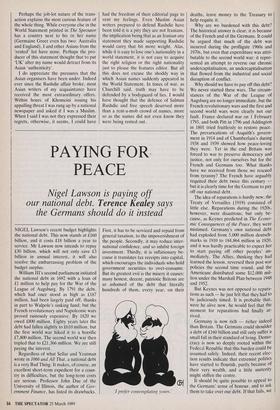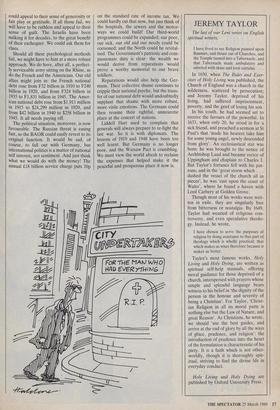PAYING FOR PEACE
Nigel Lawson is paying off the Germans should do it instead
NIGEL Lawson's recent budget highlights the national debt. This now stands at £160 billion, and it costs £18 billion a year to service. Mr Lawson now intends to repay £30 billion, which will not only save £3 billion in annual interest, it will also resolve the embarrassing problem of the budget surplus.
William Ill's second parliament initiated the national debt in 1692 with a loan of IA million to help pay for the War of the League of Augsburg. By 1791 the debt, which had once stood as high as £187 million, had been largely paid off, thanks in part to Walpole's sinking fund; but the French revolutionary and Napoleonic wars proved ruinously expensive. By 1820 we owed £800 million. Eighty years later the debt had fallen slightly to £610 million, but the first world war hiked it to a horrific £7,800 million. The second world war then tripled that to £21,366 million. We are still paying the interest.
Regardless of what Sellar and Yeatman wrote in 1066 and All That, a national debt is a very Bad Thing. It makes, of course, an excellent short-term expedient for a coun- try in difficulties, but the long-term costs are serious. Professor John Due of the University of Illinois, the author of Gov- ernment Finance, has listed its drawbacks. First, it has to be serviced and repaid from general taxation, to the impoverishment of the people. Secondly, it may reduce inter- national confidence, and so inhibit foreign investment. Thirdly, it is inflationary be- cause it translates tax receipts into capital, which encourages the individuals who hold government securities to over-consume. But its greatest evil is the misery it causes: many honest, decent, patriotic Britons are so ashamed of the debt that literally hundreds of them, every year, on their
'1 prefer contemplating yours.' deaths, leave money to the Treasury to help requite it.
Why are we burdened with this debt? The historical answer is clear: it is because of the French and of the Germans. It could be argued that much of the debt was incurred during the profligate 1960s and 1970s, but even that expenditure was attri- butable to the second world war: it repre- sented an attempt to reverse our chronic undercapitalisation, an undercapitalisation that flowed from the industrial and social disruption of conflict.
Why should we have to pay off this debt? We never started these wars. The circum- stances of the War of the League of Augsburg are no longer immediate, but the French revolutionary wars and the first and second world wars were clearly not our fault. France declared war on 1 February 1793, and both Pitt in 1796 and Addington in 1801 tried fruitlessly to restore peace. The prevarications of Asquith's govern- ment in 1914 and of Chamberlain's during 1938 and 1939 showed how peace-loving they were. Yet in the end Britain was forced to war to preserve democracy and justice, not only for ourselves but for the French and Germans too. What thanks have we received from those we rescued from tyranny? The French have arguably requited their debt twice this century — but it is clearly time for the Germans to pay off our national debt.
The idea of reparations is hardly new; the Treaty of Versailles (1919) consisted of little else. Reparations during the 1920s, however, were disastrous; but only be- cause, as Keynes predicted in The Econo- mic Consequences of the Peace, they were mistimed. Germany's own national debt had exploded from 5,0(1) million deutsch- marks in 1910 to 184,864 million in 1920, and it was hardly practicable to expect her to start paying off other peoples' im- mediately. The Allies, thinking they had learned the lesson, reversed their post war policies the second time round, and the Americans distributed some $12,000 mil- lion under the Marshall Plan between 1948 and 1952.
But Keynes was not opposed to repara- tions as such — he just felt that they had to be judiciously timed. It is probable that, were he alive now, he would feel that the moment for reparations had finally ar- rived.
Germany is now rich — richer indeed than Britain. The Germans could shoulder a debt of £160 billion and still only suffer a small fall in their standard of living. Demo- cracy is now so deeply rooted within the Feder al Republic that this burden could be assumed safely. Indeed, their recent elec- tion results indicate that extremist politics have started to flourish, partly because of their very wealth, and a little austerity might stiffen the centre.
It should be quite possible to appeal to the Germans' sense of honour, and to ask them to take over our debt. If that fails, we could appeal to their sense of generosity or fair play or gratitude. If all those fail, we will have to be ruthless and appeal to their sense of guilt. The Israelis have been milking it for decades, to the great benefit of their exchequer. We could ask them for clues.
Should all these psychological methods fail, we might have to hint at a more robust approach. We do have, after all, a perfect- ly serviceable army sitting on the Rhine, as do the French and the Americans. Our old allies might join in: the French national debt rose from F32 billion in 1910 to F240 billion in 1920, and from F324 billion in 1935 to F1,831 billion in 1945. The Amer- ican national debt rose from $1,911 million in 1915 to $24,299 million in 1920, and from $42 billion in 1940 to $258 billion in 1945. It all needs paying off.
The political situation, moreover, is now favourable. The Russian threat is easing fast, so the BAOR could easily revert to its original function. It would be sad, of course, to fall out with Germany, but international politics is a matter of national self interest, not sentiment. And just think what we would do with the money! The annual £18 billion service charge puts 10p
on the standard rate of income tax. We could hardly cut that now, but just think of the hospitals, the sewers and the motor- ways we could build! Our third-world programmes could be expanded; our poor, our sick, our old and our needy could be cocooned; and the North could be revital- ised. The Government's patriotic and com- passionate duty is clear: the wealth we would derive from reparations would prove a worthy memorial to our brave soldiers.
Reparations would also help the Ger- mans. Their collective shame continues to cripple their national psyche, but the trans- fer of our national debt would undoubtedly supplant that shame with more robust, more virile emotions. The Germans could then resume their rightful, unneurotic place at the concert of nations.
Liddell Hart used to complain that generals will always prepare to re-fight the last war. So it is with diplomats. The lessons of 1919 and 1948 have been too well learnt. But Germany is no longer poor, and the Warsaw Pact is crumbling. We must view the world afresh to reclaim the expenses that helped make it the peaceful and prosperous place it now is.



















































 Previous page
Previous page